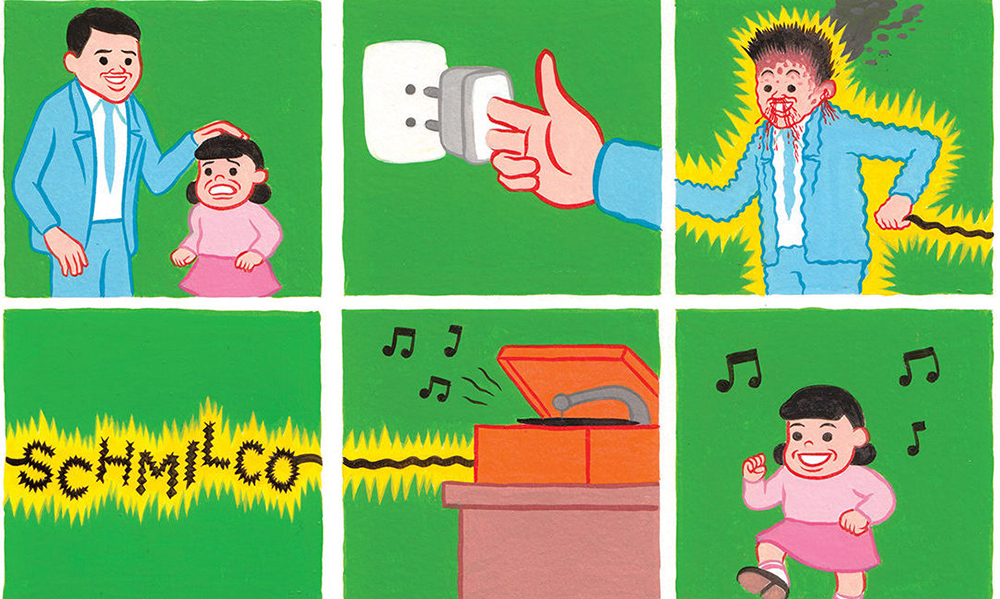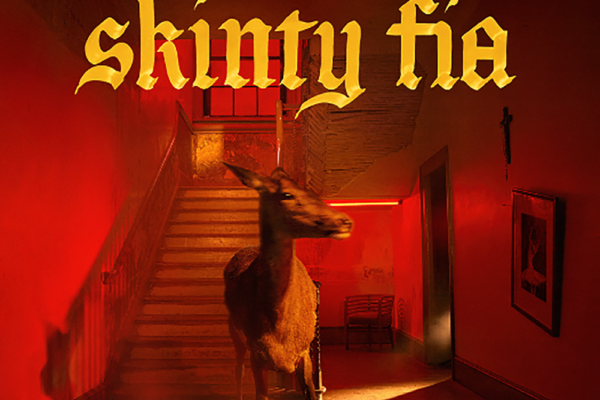Schmilco is easily listenable. Like its predecessor Star Wars, it is short, fitting with room on one standard LP. (For reference, A.M. and Wilco(The Album) are the only other single LPs in their discography.) Unlike many of Wilco’s previous albums, Schmilco makes no attempts to subvert the listener through any type of gated and back-masked Stravinsky, or twelve minutes of reverb, or ending a song with a Shepard Tone, or any of the other ways that Wilco have used their right to destroy their own song. With little exception, focusing on the arrangements, this is an alt-country record. The band members find few places for the extraordinary flourishes that have become commonplace on a Wilco record. So why does this album feel so jarring? Well, because Schmilco is a lot like a David Lynch film.
Upon first glance in a David Lynch film everything is idyllic. It’s that old Stepford America where every man is hard at work at his union job while every woman is at home keeping house and every child at school. But there’s always that moment when the camera pans down and you can see the bugs are nesting underneath the perfectly manicured lawn, that there’s a lady in the radiator singing, and someone killed the Palmer girl in the quiet, peaceful town of Twin Peaks.
Throughout the album, just bubbling under the surface is a tension between the outwardly world of the normals, and the world portrayed by Tweedy’s lyrics. He’s “buried more and more and more and more,” or “swaying through the catacombs,” a tavern “as cold and dark as a cavern,” or even placing himself in his mother’s grave and finding just “roses and Tanqueray.” It’s here in these places where Tweedy finds himself at his most moody since 2004s A Ghost is Born. Cries and moans are literally and figuratively everywhere.
Like Jeffrey Beaumont and Sandy Williams in Blue Velvet, or the younger cast in Twin Peaks, a young Tweedy gets in over his head time and again. This is a major theme for Lynch who has his kids trying to solve murder mysteries, inadequately. Tweedy spent his childhood (“before I could drive, before I could vote”) drunk and high and he out and out says this on the first track “Normal American Kids.” In “Quarters” he’s working in his grandfather’s bar sweeping up around the drunks to earn quarters to put into the jukebox. He takes you back in one of the more figurative moments of the album, as the song breaks down into this translucent radiator music so you can imagine what it must have been like for him to sit there listening to that jukebox.
For Tweedy, all this talk of getting high and drunk, working at a bar for music has him wondering if he “ever was a child.” But childhood is the time spent practicing or pretending to be an adult; followed by that thickheadedness of being a teenager and thinking you got everything figured out. Consider the title, aped from the underrated Harry Nilsson’s underrated masterpiece Schmilsson. Called Shm-reduplication in linguistics, even it stubbornly subverts the concept of Wilco itself, where say Wilco (The Album) celebrated the band. And Schmilco is the kind of album that could take excellent musicians and bury them in the mix instead of showing them off.
It’s that petulant attitude that turns a multi-million selling charity single to it’s negative—we aren’t the world, we aren’t the children. That song, “We Aren’t The World (Safety Girl),” along with “Shrug and Destroy,” imagines a solipsistic Armageddon: “I wonder who destroys/ when nothing is left, rejoice.” Even “Locator” hints at a nighttime struggle between an all-seeing deity that demands fealty that is the familiar struggle of belief in religion once you hit the age of reason (“Theologians” from A Ghost is Born gives us our best insight on how that turned out).
For Wilco, and for Tweedy as main songwriter, obscure lyricism isn’t something new. He, like David Lynch, knows telling a story straight isn’t necessarily the best way to get a message across. How you got from A to B isn’t as important as what was learned along the way whether you’re the character or the audience. Schmilco is the first album where Tweedy has brought a dreamworld instead of the present to the forefront and spent an entire album exploring that motif. Like the third act of Mulholland Drive, it puts a kind of twist (neither good, nor bad) on everything that came before it. This is what makes Schmilco feel distinct from the rest of the discography. It’s almost intimate and certainly familial, from a man who confessed to being distant, telling lies for love; and in a reversal makes being close feel strange. And like Lynch’s films, it leaves the viewer looking for any insight, any answers: Who am I? How did I get here?
Article: Christopher Gilson




